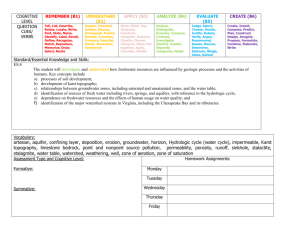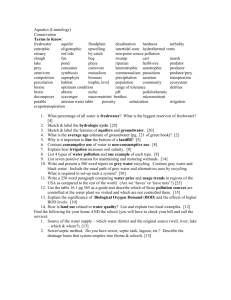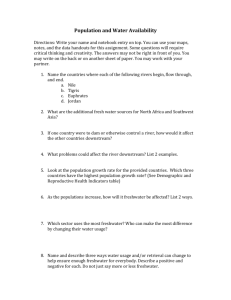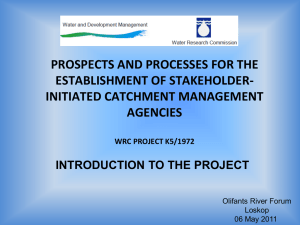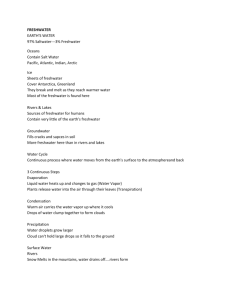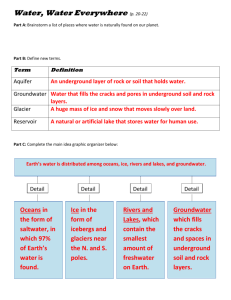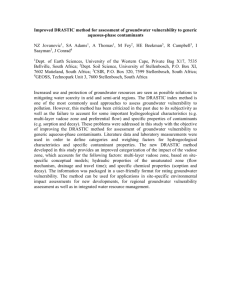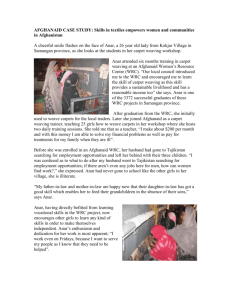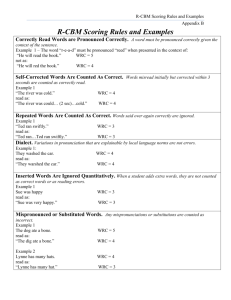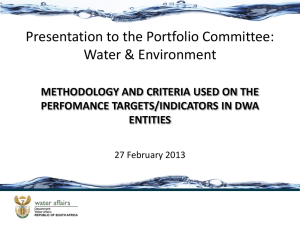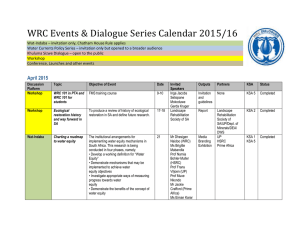UNEP launches a book_TSedited2
advertisement
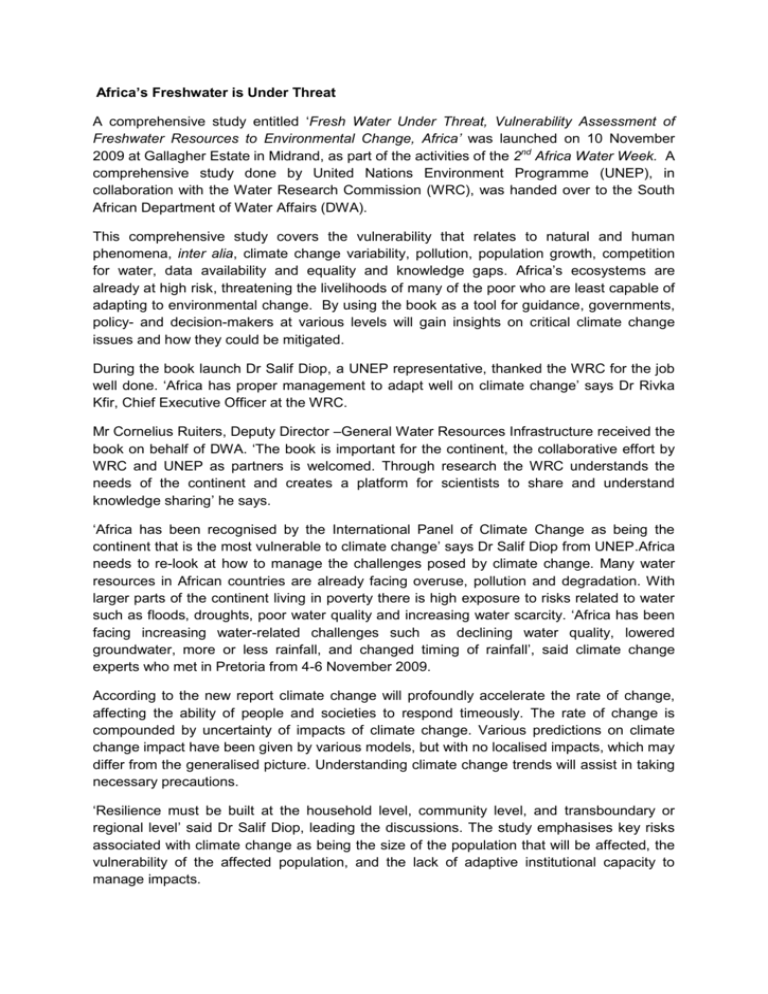
Africa’s Freshwater is Under Threat A comprehensive study entitled ‘Fresh Water Under Threat, Vulnerability Assessment of Freshwater Resources to Environmental Change, Africa’ was launched on 10 November 2009 at Gallagher Estate in Midrand, as part of the activities of the 2nd Africa Water Week. A comprehensive study done by United Nations Environment Programme (UNEP), in collaboration with the Water Research Commission (WRC), was handed over to the South African Department of Water Affairs (DWA). This comprehensive study covers the vulnerability that relates to natural and human phenomena, inter alia, climate change variability, pollution, population growth, competition for water, data availability and equality and knowledge gaps. Africa’s ecosystems are already at high risk, threatening the livelihoods of many of the poor who are least capable of adapting to environmental change. By using the book as a tool for guidance, governments, policy- and decision-makers at various levels will gain insights on critical climate change issues and how they could be mitigated. During the book launch Dr Salif Diop, a UNEP representative, thanked the WRC for the job well done. ‘Africa has proper management to adapt well on climate change’ says Dr Rivka Kfir, Chief Executive Officer at the WRC. Mr Cornelius Ruiters, Deputy Director –General Water Resources Infrastructure received the book on behalf of DWA. ‘The book is important for the continent, the collaborative effort by WRC and UNEP as partners is welcomed. Through research the WRC understands the needs of the continent and creates a platform for scientists to share and understand knowledge sharing’ he says. ‘Africa has been recognised by the International Panel of Climate Change as being the continent that is the most vulnerable to climate change’ says Dr Salif Diop from UNEP.Africa needs to re-look at how to manage the challenges posed by climate change. Many water resources in African countries are already facing overuse, pollution and degradation. With larger parts of the continent living in poverty there is high exposure to risks related to water such as floods, droughts, poor water quality and increasing water scarcity. ‘Africa has been facing increasing water-related challenges such as declining water quality, lowered groundwater, more or less rainfall, and changed timing of rainfall’, said climate change experts who met in Pretoria from 4-6 November 2009. According to the new report climate change will profoundly accelerate the rate of change, affecting the ability of people and societies to respond timeously. The rate of change is compounded by uncertainty of impacts of climate change. Various predictions on climate change impact have been given by various models, but with no localised impacts, which may differ from the generalised picture. Understanding climate change trends will assist in taking necessary precautions. ‘Resilience must be built at the household level, community level, and transboundary or regional level’ said Dr Salif Diop, leading the discussions. The study emphasises key risks associated with climate change as being the size of the population that will be affected, the vulnerability of the affected population, and the lack of adaptive institutional capacity to manage impacts. The coastal areas of West Africa (from Senegal to Nigeria) and Eastern and Southern Africa (from Mozambique to Tanzania) and the Nile delta, are at risk from flooding due to sea level rise, storm surges (except Nile delta), and saline intrusion into surface and groundwater. Over 70 million people are already at risk in those areas. The great lakes of the Rift Valley (Lakes Victoria, Turkana, Tanganyika and Malawi) and Lake Chad are extremely vulnerable to climate change. Around 50 million people depending on these lakes are already experiencing a reduction in fish stocks, decreasing water quality, and reduced water levels. Climate change will exacerbate these trends with the possibility of the collapse of fisheries, loss in biodiversity, increased eutrophication and decreased water quality. ‘In the semi- arid regions of the Sahel, central and eastern Southern Africa, and the Horn of Africa, large rural and peri-urban communities are largely dependent on rain-fed agriculture, and bio-mass derived energy’ says the report. Their water supplies are often insecure and may be dependent on groundwater. Increased climatic variability in these regions, combined with more intense droughts and floods, increased temperatures, and lower rainfall overall, will put these communities hugely at risk. In Southern Africa the vulnerability of communities to climate change is exacerbated by extremely high prevalence of HIV/AIDS’ says Chris Moseki, WRC research manager. ‘The water towers’ of Central, West and East Africa, (Congo forests, the Fauta Djallon mountain areas and the Ethiopian highlands) need to be protected. As part of mitigation, there needs to be protection of quantity and quality of water through conservation and restoration of critical forest areas and protection of biodiversity. The study highlights five key adaptation responses and opportunities: The Vaal River: South Africa Regional integration and development: African governments need to make climate change a core development activity relating to food, energy and water security and economic and social development strategies. Development visions should extend beyond the basin or national boundary and incorporate opportunities for regional economic integration. To achieve this vision there is a critical need for transboundary cooperation around groundwater and surface water. Institutional capacity: Water institutions must build their capacity to monitor water resources (surface water and groundwater) for water resource assessment and for water resource management. Engagement with stakeholders at national, regional and local level,and providing an enabling environment for communities and water users to adapt to change is part of this institutional capacity. Finance and investment: Investing in water infrastructure is still a huge challenge in Africa. There is a need for African governments to ramp up innovations such as an adaptation fund and to give commitments to funding. It is important to recognise that infrastructure (from small-scale infrastructure through to big dams) should be invested in because of its development potential, not specifically as a climate change response. The infrastructure design should withstand changes in climate change. Investment in hydropower and other renewable energy sources such as wind and solar energy, is an important contribution to the reduction of land degradation and overharvesting of biomass for energy. The adoption of appropriate technologies in the face of rapid change, at a range of levels, should be supported by improved south/south and south/north exchange, particularly to support improved livelihoods for, and the resilience of, those living in poverty. This may include appropriate technologies to support the shift from rainfed to supplementary or irrigation agriculture in areas where rainfall is likely to decrease. Information: Better information is an important element of responding to climate change, particularly in the transboundary basin context where shared information is an important element of building the common view of challenges and potential responses, and building trust between countries. This requires, inter alia, increased investment in monitoring of groundwater and surface water resources, improved capacity for short-term forecasting and long-term modelling, improved dissemination of information and interpretation of scientific data for management and political decision-makers. Land use management: Many of the responses to the freshwater impacts of climate change fall outside the water sector. A key response in this regard is improved land use management, particularly in the ‘water towers’ and at-risk coastal zones. Integrated land use, urban and water planning is needed to address the multi-faceted risks and impacts of climate change. Effective land-use planning and enforcement is also necessary to protect key ecosystems and to ensure the sustainable management of water-related natural resources. Sources : 1. Freshwater Under Threat: Vulnerability Assessment of Freshwater Resources to Environmental Change (DEWA/WRC)Job No 1104/B4)2008 2. Assessment of Transboundary Freshwater Vulnerability in Africa to Climate Change (draft) -UNEP /WRC /Pegasys) Nov, 2009.
